Editor’s Note: The Sustainable Innovation MBA Class of 2019 arrived on campus this week for orientation, the beginning of an intensive year of learning, discovery, and shaping of their futures. The following message to the new cohort was written by Kevin Hoskins ’18, reflecting on his own orientation week, his class’s recent graduation, and everything in between.
It’s hard to believe it’s over. It all went by so fast.
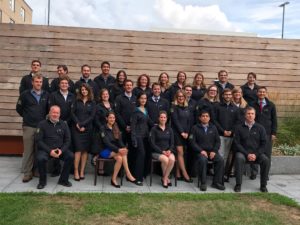 Last August, I packed up a van filled with my belonging and headed north, first on I-93 and then on I-89. I had come to Burlington to participate in a one-year, intensive MBA program. I had resisted graduate school and more formal education for a while, but something about this program spoke to me.
Last August, I packed up a van filled with my belonging and headed north, first on I-93 and then on I-89. I had come to Burlington to participate in a one-year, intensive MBA program. I had resisted graduate school and more formal education for a while, but something about this program spoke to me.
I soon found myself in a room surrounded by people that felt the same. We had come from different backgrounds, different work experiences, and from different areas of the country, a few from other nations.
What we soon found out is that we shared a similar feeling: that business-as-usual was no longer working and that it is time to transform and, if necessary, create businesses to respond to society’s challenges in a way that is more sustainable. That is, we need more market-based solutions to the challenges that face the world today.
“It all goes by so fast.”
In fact, it was a year ago today that I first met the other members of my cohort. They are, and remain, some of the most amazing people I’ve met. And I feel honored to have spent a year in a windowless room with them.
We began the year with a quintessential UVM activity: a trip to the university’s ropes course. In the first of many surreal moments this year, we also took turns looking at the solar eclipse that happened to be taking place that day. Then we played games to get to know each other, followed by other trust-building activities on the actual course. As I walked home that evening, reflecting on the experience and the first day of class, I remember thinking, “This is going to be a wild year. Enjoy the ride.”
We began the year studying business foundations: finance, strategy, brand marketing, and organizational behavior. We learned about the sustainability challenges facing the world. But soon enough, we found ourselves exploring topics that get at the heart of those challenges: strategic CSR, entrepreneurship, innovation, supply chain issues, public policy, and community development. And before we knew it, we were applying what we had learned in the classroom with businesses and organizations with real world challenges.
I tried to go into this year with no expectations for the experience. My initial goals were only to work as hard as I could and enjoy every minute of it. We know not if we’ll ever pass this way again…or something like that.
So, my advice, both to this next cohort and anyone that happens to be reading this, is to enjoy every minute of your time here. This is a once-in-a-lifetime experience. Soak up every moment of it. Take advantage of every opportunity. Enjoy the time you have with the people you’re lucky enough to share a room with. Learn from them. And approach it all with a growth mindset: your intelligence and talent got you here, but the world needs more people that also have a love of learning, that communicate effectively, that work well on a team, and that have the resilience to get across the finish line.
The time flies by. Before you know it, you’ll be saying goodbye and moving onto your next opportunity. And if you’re lucky, you’ll be sitting here a year from now being thankful for every single minute that you got to spend with some of your new favorite people. Enjoy the ride. It all goes by so fast.

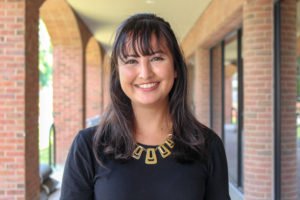 Why did you choose to attend The Sustainable Innovation MBA program?
Why did you choose to attend The Sustainable Innovation MBA program?



 I chose to join The Sustainable Innovation MBA program for a variety of reasons but one was the desire to find others who share the drive and fire to put their shoulders into the work that desperately needs to be done in the world. It is an odd thing to have the idea for that and then meet people who exceed your expectations. The excitement of being around actual humans with impressive and diverse backgrounds, rather than just concepts that such people exist, has been a pleasant condensation of reality.
I chose to join The Sustainable Innovation MBA program for a variety of reasons but one was the desire to find others who share the drive and fire to put their shoulders into the work that desperately needs to be done in the world. It is an odd thing to have the idea for that and then meet people who exceed your expectations. The excitement of being around actual humans with impressive and diverse backgrounds, rather than just concepts that such people exist, has been a pleasant condensation of reality.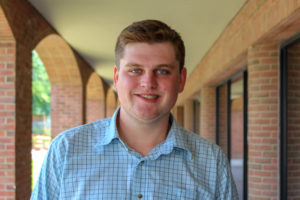 The truly daunting part of this experience is the slew of intangibles that you don’t prepare for: the people you might meet, the things you might say, or the unexpected things you might learn. I think I speak for much of my cohort when I say that the first steps into Kalkin 110 on Monday were some of the most exciting and terrifying steps of my life.
The truly daunting part of this experience is the slew of intangibles that you don’t prepare for: the people you might meet, the things you might say, or the unexpected things you might learn. I think I speak for much of my cohort when I say that the first steps into Kalkin 110 on Monday were some of the most exciting and terrifying steps of my life. Last August, I packed up a van filled with my belonging and headed north, first on I-93 and then on I-89. I had come to Burlington to participate in a one-year, intensive MBA program. I had resisted graduate school and more formal education for a while, but something about this program spoke to me.
Last August, I packed up a van filled with my belonging and headed north, first on I-93 and then on I-89. I had come to Burlington to participate in a one-year, intensive MBA program. I had resisted graduate school and more formal education for a while, but something about this program spoke to me.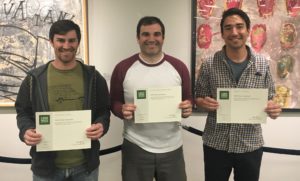 Today, the importance of LEED is underestimated, and the students believe that it will soon become the norm, becoming part of all building codes. The built environment accounts for more than a third of our total energy usage, as well as an immense amount of fresh water. And buildings take up a lot of space, disrupting natural drainage systems and increasing the urban heat island affect. Leadership in Energy and Environmental Design (LEED) is a certification system made to create greener buildings and more livable urban environments. It is estimated that people will spend up to 90% of their time indoors, so it makes sense to prioritize both healthier and more environmentally friendly buildings.
Today, the importance of LEED is underestimated, and the students believe that it will soon become the norm, becoming part of all building codes. The built environment accounts for more than a third of our total energy usage, as well as an immense amount of fresh water. And buildings take up a lot of space, disrupting natural drainage systems and increasing the urban heat island affect. Leadership in Energy and Environmental Design (LEED) is a certification system made to create greener buildings and more livable urban environments. It is estimated that people will spend up to 90% of their time indoors, so it makes sense to prioritize both healthier and more environmentally friendly buildings.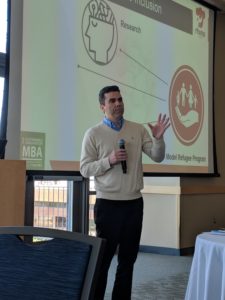
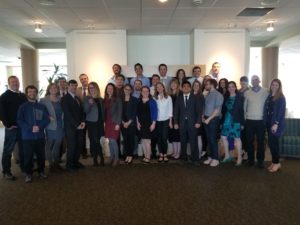 Students pitched scoping for projects at companies such as Keurig Green Mountain, Griffith Foods, Essilor, Seventh Generation, and Caterpillar.
Students pitched scoping for projects at companies such as Keurig Green Mountain, Griffith Foods, Essilor, Seventh Generation, and Caterpillar.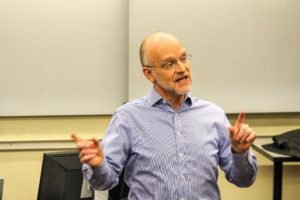 Reed got his start in advocacy and grassroots work in Michigan. He discussed the evolution of his thinking from an “us versus them” mentality (environmentalists versus business) to understanding business’s role in society (and the part that sustainability-minded professionals can play).
Reed got his start in advocacy and grassroots work in Michigan. He discussed the evolution of his thinking from an “us versus them” mentality (environmentalists versus business) to understanding business’s role in society (and the part that sustainability-minded professionals can play).